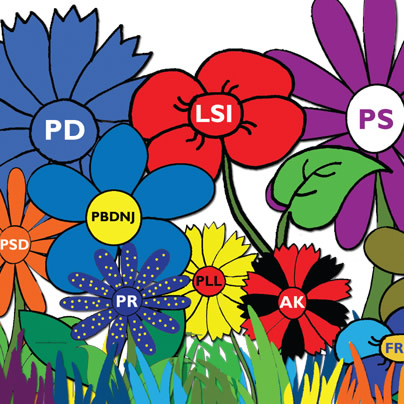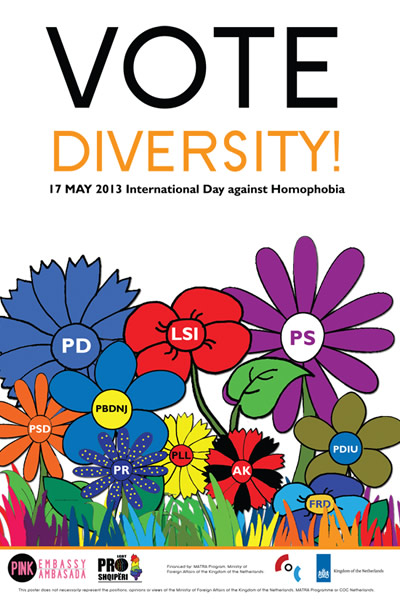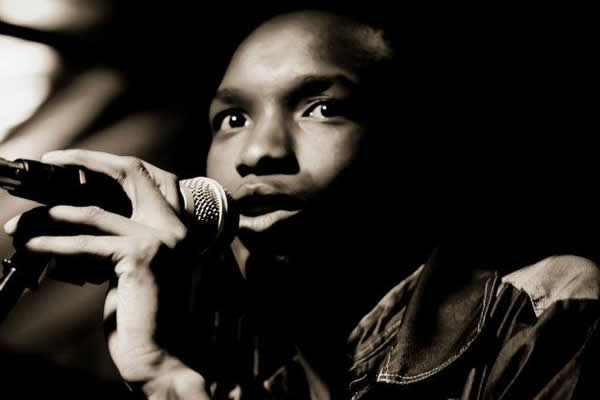World
Around the world, May 17 recognized as ‘gay day’
LGBT activists from Albania to Uganda prepare to mark day against bias


LGBT rights groups in Albania plan to commemorate IDAHO. (Photo courtesy of Amarildo Fecanji/PINK Embassy)
LGBT rights advocates in more than 100 countries around the world will commemorate the International Day Against Homophobia on May 17 with a series of marches, workshops, performances and other events.
Identoba, an LGBT advocacy group in Georgia, is planning a flash mob in front of the country’s old Parliament building in the country’s capital, Tbilisi, on May 17 during which participants will make a rainbow flag with their T-shirts. Botswanan playwright and activist Kalvin K. Kol-Kes is staging his play “BUTCHered” inspired by Mart Crowley’s “Boys in the Band” that focuses on a group of friends who are predominantly lesbian.
Cuba’s National Center for Sexual Education (CENESEX) has scheduled a series of events across Cuba to commemorate IDAHO. Nicaraguan advocacy groups will march through the streets of Managua, the country’s capital, on May 17 to demand respect and what organizers describe as “dignified treatment” for LGBT people.
Washington National Cathedral in D.C. on May 17 will host a screening of the film “God Loves Uganda” and a panel discussion on the state of LGBT rights in the East African country. Thousands of people are expected to take part in a march for LGBT rights in San Juan, Puerto Rico, on the same day.
Zaque, an LGBT youth group in the Australian city of Ballarat in the country’s Victoria state will hold a number of events to commemorate IDAHO. These include the launch of a new iPhone app.
“For the young people of Zaque, IDAHO is important because it is a day for them to stand up and be proud and say that homophobia is not OK,” Ballarat City Councilor Belinda Coates told the Washington Blade. “It’s a celebration of who they are and allows them to be leaders and educators within the community.”
The Albanian LGBT advocacy group PINK Embassy will hold its second annual diversity festival in Tirana, the country’s capital that will feature exhibits with messages and posters the group’s general manager, Amarildo Fecanji, described to the Blade as a “short resume of what has been achieved so far.”
Fecanji’s group will also host panels that will examine media coverage of LGBT-specific issues and how they factor into Albanian politics and gay youth. Pink Embassy and other human rights organizations will also stage a diversity fair in the center of Tirana.
“Slowly but steadily May 17 is coming to be recognized as the gay day,” Fecanji told the Blade when asked how he feels IDAHO bolsters his group’s advocacy efforts in the southeastern European country. “That for people is an opportunity for society to sort of come together.”
IDAHO first took place on May 17, 2005, to commemorate the World Health Organization’s decision to declassify homosexuality as a mental disorder. Organizers have subsequently added transphobia and biphobia to their mission.
This year’s IDAHO takes place against the backdrop of the recent extension of marriage rights to same-sex couples in France, New Zealand, Uruguay and several Brazilian states that include Rio de Janeiro. Gays and lesbians can also now legally tie the knot in nine U.S. states and D.C. and will soon be able to do so in Delaware and Rhode Island.
Canadian and Dutch lawmakers earlier this year approved a transgender rights bills, but anti-LGBT discrimination and violence remain pervasive throughout the world.
A report by the Latin American and Caribbean Network of Transgender Women (REDLACTRANS) released earlier this year notes 61 trans women in Colombia have been reported murdered between 2005-2011. Honduran advocate José Pepe Palacios told the Blade in February while he was in the United States that at least 89 LGBT people in the Central American country have been murdered since the 2009 coup that ousted José Manuel Zelaya.
The State Department in recent years has also spoken out against anti-LGBT violence in Jamaica, Uganda, Zimbabwe and other countries.
Identoba founder Irakli Vacharadze told the Blade violence against LGBT Georgians remains a serious concern. His group’s flash mob will last only 20 minutes because he said “it’s hard to guarantee” the security of those who will take part.
A group of men last week attacked a handful of people who protested the release of a video that showed men having sex with other men.
“This is the discourse in Georgia right now,” Vacharadze told the Blade from Tbilisi. “It’s so, so ugly that you can’t rationally, reasonably argue with that. It’s basically a fist coming in your face when you’re displaying your belongingness to the community.”
Vacharadze and other activists feel IDAHO only strengthens their advocacy efforts in spite of the threats they continue to face.

Kalvin K. Kol-Kes plans to stage a short play called “BUTCHered” to commemorate IDAHO in Botswana. (Photo courtesy of Kalvin K. Kol-Kes)
“I’m very happy with a day like May 17,” Kol-Kes told the Blade last Friday from the Botswanan capital of Gaborone. “It gives you a point when you can actively state something.”
Pedro Julio Serrano of the National Gay and Lesbian Task Force noted the march in the Puerto Rican capital on May 17 will coincide with the debate over three bills that would extend adoption rights to gays and lesbians; add sexual orientation and gender identity and expression to the island’s domestic violence laws and ban anti-LGBT discrimination in employment, housing and public accommodations.
A hearing on the adoption bill is scheduled to take place in the Puerto Rico Senate hours before the march.
“We are in a historic moment and this day will help in the education of our people about the need achieve equality,” Serrano said.
Argentina
Gay, nonbinary parent fights for family in Argentina’s courts
Leonardo Hatanaka alleges they were fired after requesting paternity leave

An unprecedented case could set an important legal precedent for the rights of labor rights for LGBTQ families in Latin America.
Leonardo Hatanaka, a Brazilian pharmaceutical professional, expects an imminent ruling from the Superior Court of Justice in the Autonomous City of Buenos Aires in a case that alleges discriminatory dismissal based on sexual orientation, gender identity, and xenophobia after their son Matteo’s birth in Argentina via “solidarity gestation.” Human rights organizations and international agencies have followed the case closely.
Genzyme de Argentina S.A. and Sanofi in 2023 fired Hatanaka weeks after they notified them of their son’s paternity and requested 180-day parental leave.
“Matteo’s birth was the realization of a dream and the right to form a family with love, dignity and equality, even if that means having to fight every day for our family to be recognized as such,” Hatanaka told the Washington Blade in an exclusive interview.
The National Institute Against Discrimination, Xenophobia and Racism, a government agency known by the acronym INADI that President Javier Milei’s administration has shut down, in November 2023 said Hatanka’s termination was motivated by discrimination based on sexual orientation and gender identity.
(Milei took office in December 2023.)
The General Directorate of Coexistence in Diversity in Buenos Aires’s government in 2024 said institutional xenophobia motivated the firing.
“I am a gay man, foreign, nonbinary, and I had requested to exercise my right to parental leave,” Hatanaka explained. “The company denied access to a basic right to care, which it does provide in other countries, and did not provide any medical coverage for our son, despite his legal registration with both parents’ names.”
Sanofi did not acknowledge responsibility, offer apologies or any kind of reparations, despite the two rulings.
“It was devastating. I was caring for a newborn, at a moment of enormous vulnerability, and the company chose just that moment to abandon us,” said Hatanaka.
The National Labor Court overturned an initial injunction that ordered Hatanaka’s reinstatement. Hatanaka appealed the decision to the Superior Court of Justice in the Autonomous City of Buenos Aires.
“I hope for justice; that the discrimination suffered is recognized, and that this ruling serves as a precedent for all diverse families and LGBTQ+ people who are seeing their rights violated,” said Hatanaka.
The Argentine LGBT Federation, SOS Homophobie in France, and Mothers of Resistance in Brazil are among the organizations that have expressed their support. The latest U.N. report on anti-LGBTQ discrimination also notes the case.
“Companies must go beyond marketing,” Hatanaka emphasized. “Real inclusion requires concrete actions, consistency, and respect for their own policies.”
Hatanaka stressed that “there are instruments such as the UN Guiding Principles on Business and Human Rights. It is time for them to comply with them.” The lawsuit has also become a symbol of the struggle for equality and protection of families with parents who are the same sex.
“I feel I represent many LGBTQ+ families who live in fear of losing everything by exercising their rights,” said Hatanaka. “LGBTQ+ parenting is legitimate, real and deserves protection. No family should be punished for existing.”
Myanmar
LGBTQ advocacy group joins Myanmar earthquake relief effort
March 28 quake killed thousands, devastated country’s second-largest city

A powerful earthquake that rocked Myanmar on March 28 unleashed devastation across the central part of the country.
The U.S. Geological Survey measured the quake at 7.7, and pinpointing its epicenter roughly 10 miles west of Mandalay, the country’s second-largest city. A 6.4-magnitude aftershock jolted the area 12 minutes later, compounding the destruction and deepening the crisis for a nation already strained by conflict.
The earthquake struck with terrifying intensity near its epicenter, wreaking havoc on Mandalay and the nearby city of Sagaing.
Mandalay, a bustling city of approximately 1.5 million residents, bore the brunt of the destruction. Among the most striking losses was the 12-story Sky Villa Condominium, which collapsed, leaving scores trapped beneath the wreckage. Rescue workers scrambled to pull survivors from the rubble, but the rising death toll underscored the tragedy’s magnitude.
In Sagaing, which is located closer to the epicenter, more than 70 percent of buildings sustained damage. The Ava Bridge, an essential artery spanning the Irrawaddy River, collapsed, cutting off a critical connection to Mandalay. The earthquake’s shallow depth of less than seven miles amplified its power, reducing homes, temples, and schools to rubble.
The earthquake’s death toll continues to climb, with at least 3,649 confirmed dead, more than 5,000 injured, and approximately 145 people missing. Amid the widespread devastation, questions loom about the impact on vulnerable populations. The Washington Blade reached out to Colors Rainbow, an organization advocating for LGBTQ rights in Myanmar, to understand how the crisis has affected one of the nation’s most marginalized communities.
Colors Rainbow Executive Director Hla Myat Tun spoke about how his organization is working to address the crisis faced by Myanmar’s LGBTQ community in the aftermath of the earthquake.
Colors Rainbow has implemented a system of multipurpose cash transfers, directing funds to local LGBTQ partner organizations. These grassroots partners, in turn, provide essential support to affected individuals that includes emergency cash assistance, food, non-food items, clean water, and basic emotional support tailored to the immediate needs of their communities.
“We estimate that around 500–800 LGBTQ individuals have been impacted in the affected areas, particularly in Mandalay Region, Sagaing Region, and southern Shan state,” said Hla Myat Tun. “So far, we have been able to directly assist around 80–100 LGBTQ individuals.”
Hla Myat Tun told the Blade that Colors Rainbow is actively gathering data to assess the specific challenges that LGBTQ people are facing in the aftermath of the earthquake.
Preliminary observations, he noted, point to heightened vulnerability among LGBTQ people, driven by social exclusion and limited access to mainstream humanitarian aid. Hla Myat Tun, however, emphasized more comprehensive information is necessary to fully understand the scope of their needs and vulnerabilities in this crisis.
“We are partnering with international LGBTQ and feminist organizations that focus on displaced communities,” said Hla Myat Tun. “These partners provide emergency funds, and we coordinate with local LGBTQ groups to deliver aid directly to affected individuals on the ground.”
Addressing reports of military restrictions on humanitarian aid, Hla Myat Tun explained how Colors Rainbow is managing to reach LGBTQ people who are in conflict zones and areas the military junta controls. Hla Myat Tun highlighted the importance of the organization’s trusted local LGBTQ partners, who are embedded in these regions. Their presence and established networks, he said, are vital in navigating restricted areas and ensuring that aid reaches the LGBTQ people who are most in need.
Hla Myat Tun also provided insight into how Colors Rainbow is tailoring its relief efforts to meet the LGBTQ community’s specific needs.
He said his organization is gathering information directly from LGBTQ people through close coordination with its local partners, relying on both formal and informal communication channels. Hla Myat Tun told the Blade his team conducts daily check-ins via quick telephone calls, ensuring a continuous flow of information to guide their response efforts despite limited internet access, electricity and other challenges.
“Our approach is collaborative — we set strategies and share responsibilities to respond flexibly and safely, based on the rapidly changing local context,” he said. “Personal stories are being documented, but for security reasons, we are cautious about sharing them publicly.”
When asked whether staff or volunteers had harassment, discrimination, or violence while delivering aid — a concern given the precarious legal and social climate for LGBTQ people in Myanmar — Hla Myat Tun said there have been no reported incidents thus far.
“So far, we haven’t received any reports from our staff or local partners about harassment or violence while delivering aid,” he noted, emphasizing Colors Rainbow remains vigilant and has implemented robust safety protocols to protect all involved.
Colors Rainbow relies primarily on funding from international LGBTQ-focused partners. He noted, however, humanitarian funding specifically dedicated to LGBTQ communities remains vastly under-resourced, relative to the pressing needs on the ground. Hla Myat Tun said this shortfall severely limits the scale and reach of Colors Rainbow’s efforts.
“While Myanmar’s legal framework remains outdated, societal attitudes — especially during the civilian government — have shown signs of progress,” said Hla Myat Tun. “We have seen positive change thanks to the work of local LGBTQ organizations.”
“In the current crisis, many communities are working together despite legal barriers. However, in areas without LGBTQ-led organizations, inclusive humanitarian responses are still lacking,” he added. “There’s an urgent need for international humanitarian actors to understand and implement LGBTQ-inclusive practices in Myanmar.”
When asked about long-term strategies to support the recovery and resilience of LGBTQ communities as Myanmar rebuilds, Hla Myat Tun affirmed Colors Rainbow is deeply committed to fostering resilience. The organization’s initiatives include leadership development, community empowerment through training and workshops, sub-granting programs, and organizational development support. He also highlighted Colors Rainbow’s advocacy for LGBTQ-inclusive policies and collaboration with ethnic groups to promote an inclusive federal democracy, and specifically thanked Outright International, a global LGBTQ and intersex rights group, for “amplifying our work.
“This kind of international attention shines a spotlight on the challenges LGBTQ communities in Myanmar are facing and helps open doors for more support,” Hla Myat Tun told the Blade. “It also boosts visibility and solidarity, both locally and globally, which we deeply appreciate.”
Hungary
Hungarian MPs amend constitution to ban public LGBTQ events
Viktor Orbán’s government spearheaded amendment

Hungarian MPs on Monday voted to amend their country’s constitution to ban public LGBTQ events.
The vote took place less than a month after lawmakers banned Pride events and gave authorities the green light to use facial recognition technology to identify those who participate in them.
The Associated Press notes MPs approved the constitutional amendment — which Prime Minister Viktor Orbán’s Fidesz-KDNP coalition government proposed — by a 140-21 vote margin. Authorities before the vote removed a group of protesters who tried to block the entrance to a parliament parking garage.
Orbán’s government over the last decade has moved to curtail LGBTQ and intersex rights in Hungary.
A law that bans legal recognition of transgender and intersex people took effect in 2020. Hungarian MPs that year also effectively banned same-sex couples from adopting children and defined marriage in the constitution as between a man and a woman.
An anti-LGBTQ propaganda law took effect in 2021. The European Commission sued Hungary, which is a member of the European Union, over it.
MPs in 2023 approved the “snitch on your gay neighbor” bill that would have allowed Hungarians to anonymously report same-sex couples who are raising children. The Budapest Metropolitan Government Office in 2023 fined Lira Konyv, the country’s second-largest bookstore chain, 12 million forints ($33,115.76), for selling copies of British author Alice Oseman’s “Heartstopper.”
Former U.S. Ambassador to Hungary David Pressman, who is gay, participated in the Budapest Pride march in 2024 and 2023. Pressman was also a vocal critic of Hungary’s anti-LGBTQ crackdown.
The Washington Blade has reached out to Budapest Pride for comment on the constitutional amendment.
-

 Opinions5 days ago
Opinions5 days agoIt’s time for new leadership on the Maryland LGBTQIA+ Commission
-

 The White House4 days ago
The White House4 days agoWhite House does not ‘respond’ to reporters’ requests with pronouns included
-

 Arts & Entertainment5 days ago
Arts & Entertainment5 days ago‘Gay is Good’ Pride Pils Can Celebrates Frank Kameny’s 100th Birthday for WorldPride in D.C.
-

 Sponsored5 days ago
Sponsored5 days agoTHC Drinks: What You Should Know About Cannabis Beverages












